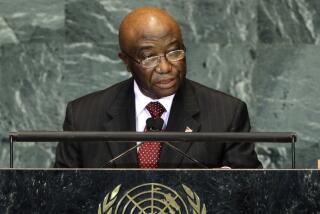In Liberia, former rivals now allies in presidential race
- Share via
Reporting from Johannesburg, South Africa — They make an odd team: the Nobel Peace Prize laureate and the former warlord who once sipped a beer while watching his men cut the ears off a president and then kill him.
But politics makes strange partners — especially in Liberia, where many public figures have a history.
Liberian President Ellen Johnson-Sirleaf, who won the peace prize this month, is pragmatic about her bid for a second six-year term. She told the BBC she was willing to work with “all Liberians” (after it became obvious she had failed to win a majority in the first round of the presidential election last week, forcing her into a runoff).
All Liberians apparently include one of her election rivals: former warlord Prince Johnson, notorious for enjoying a Budweiser as his men tortured and killed President Samuel Doe in 1990. The self-proclaimed born-again Christian, who came in third place in last week’s balloting, this week threw his support behind Johnson-Sirleaf.
The ex-warlord won only 12% of the vote, with almost all of the ballots counted. But those votes would be enough to give a majority to Johnson-Sirleaf, who polled 44%. Her closest rival, Winston Tubman, received 32%.
Johnson has told journalists he wants to use his clout to win jobs in the new government, though he says Johnson-Sirleaf hasn’t promised him a thing.
His decision appears to give Johnson-Sirleaf a strong chance of retaining office. The 72-year-old president has won international praise for taking steps to get the country back on its feet after a devastating 14-year civil war, but critics accuse her of being soft on corruption.
Johnson-Sirleaf also has a history, as Tubman and his running mate, former soccer player George Weah, are fond of pointing out.
When Liberia’s civil war broke out in 1989, Johnson-Sirleaf initially supported warlord Charles Taylor, now on trial before the U.N. Special Court for Sierra Leone on war crimes charges related to that conflict. Johnson-Sirleaf saw Taylor as a better alternative to Doe’s repressive regime, which had closed newspapers, jailed opponents (including her) and banned political parties.
The 2009 report of Liberia’s Truth and Reconciliation Commission recommended barring her and others, including Johnson, from office for 30 years for associating with the country’s warring factions. The commission also called for war crimes charges against Johnson.
Johnson-Sirleaf apologized to the people of Liberia, and some months later the report’s call to bar people from office was ruled unconstitutional by the Supreme Court.
Johnson, elected as a senator in 2005, described the president as “the lesser of two evils.” He noted that, because of term limits, she could serve only another six years, while Tubman, 70, might remain in power for 12.
“I would prefer six years to supporting anyone for 12 years,” Johnson said, clearly enjoying his role as a kingmaker.
The runoff election is set for early November.
facebook.com/latimesdixon
More to Read
Sign up for Essential California
The most important California stories and recommendations in your inbox every morning.
You may occasionally receive promotional content from the Los Angeles Times.










